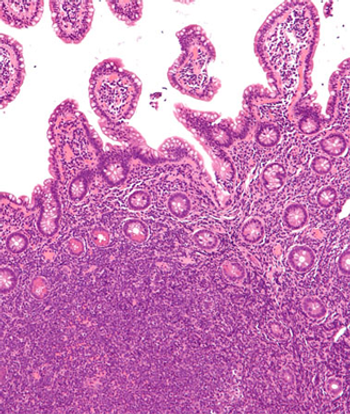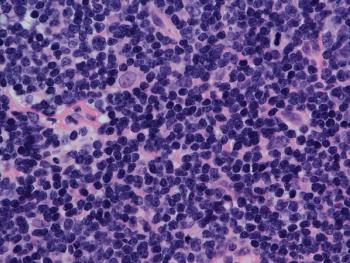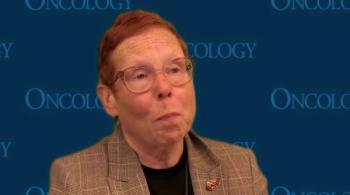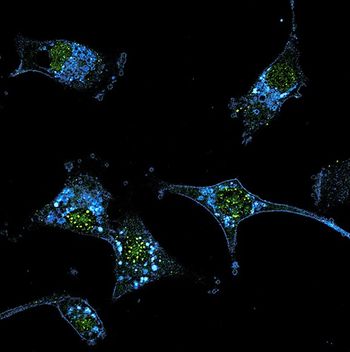
Inobrodib is under investigation as a treatment for patients with relapsed/refractory multiple myeloma and other hematologic malignancies in a phase 1/2a trial.

Your AI-Trained Oncology Knowledge Connection!


Inobrodib is under investigation as a treatment for patients with relapsed/refractory multiple myeloma and other hematologic malignancies in a phase 1/2a trial.

Data from the phase 3 CAPItello-291 trial support the new drug application for capivasertib plus fulvestrant as a treatment for patients with hormone receptor–positive, HER2-negative breast cancer.

The non-covalent BTK inhibitor shows an encouraging duration of response in patients with heavily pretreated, relapsed/refractory mantle cell lymphoma, according to data.

Thought leaders from various institutions offered their take on the biggest surprise that came out of the 2023 ASCO Annual Meeting.

The FDA’s approval of the FoundationOne Liquid CDx as a companion diagnostic may improve access to treatment with encorafenib plus cetuximab for patients with metastatic colorectal cancer harboring a BRAF V600E alteration.

A recent analysis of patients with several different hematologic malignancies finds that vulnerable patients report having worse health-related quality of life across all measures.

Daniel G. Stover, MD, describes how findings from the phase 3 NATALEE trial may support expanding the portion of patients who receive CDK 4/6 inhibitors as a treatment for hormone receptor–positive, HER2-negative breast cancer.

A single infusion of ciltacabtagene autoleucel produces a manageable safety profile among patients with relapsed/refractory multiple myeloma in the phase 1b/2 CARTITUDE-1 study.

Overall survival rates at 12 and 36 months appear to favor the addition of acalabrutinib to bendamustine and rituximab in the treatment of those with mantle cell lymphoma in a phase 1b trial.

Most treatment-related adverse effects were low-grade following treatment with BMS-986158 plus ruxolitinib or fedratinib in a population of patients with intermediate- or high-risk myelofibrosis.

Replacing vincristine with polatuzumab vedotin in R-mini-CHOP, although it hasn’t increased grade 3/4 hematologic toxicity, may increase gastrointestinal adverse effects in a cohort of frail patients with diffuse large B-cell lymphoma.

Findings from the phase 1b RedirecTT-1 study may support initiating larger studies evaluating teclistamab plus talquetamab for patients with relapsed or refractory multiple myeloma.

Investigators identify only 1 death related to treatment with acalabrutinib among older, frail patients with chronic lymphocytic leukemia in the phase 2 CLL-FRAIL trial.

Results from the phase 2 DARIA trial found an improved overall response rate in patients given daratumumab, ixazomib, and dexamethasone with relapsed/refractory multiple myeloma who were previously treated with lenalidomide.

Olvimulogene nanivacirepvec virotherapy plus chemotherapy with or without bevacizumab produces a manageable safety profile in platinum-resistant or platinum-refractory ovarian cancer in the phase 2 VIRO-15 trial.

Adding blinatumomab to Interfant-06 chemotherapy appears to be feasible and safe in the treatment infants with acute lymphoblastic leukemia in a phase 2 trial.

Daniel G. Stover, MD, suggests that stromal tumor infiltrating lymphocytes may serve as a biomarker of immune activation and can potentially help optimize therapy with microtubule-targeting agents for patients with metastatic breast cancer.

A Satellite Sessions program at the Yale Cancer Center discusses treatment paradigms and unmet needs in multiple myeloma as well as transplantation, bispecific T-cell engaging therapies, and the importance of collaborative decision-making in clinical practice.

Zanubrutinib and acalabrutinib produce similar safety profiles in the treatment of patients with relapsed/refractory chronic lymphocytic leukemia in the phase 3 ASCEND and APLINE trials.

Longitudinal ctDNA assessments may be a relevant tool for making treatment decisions for patients with EGFR-mutated non–small cell lung cancer based on findings from the phase 2 APPLE trial.

The regulatory agency has set a Prescription Drug User Fee Act date of February 7, 2024 for pembrolizumab plus chemotherapy as a treatment for patients with advanced or metastatic biliary tract cancer.

Venetoclax plus obinutuzumab with or without ibrutinib demonstrates superiority over standard chemoimmunotherapy in fit patients with chronic lymphocytic leukemia.

PRGN-3005 autologous UltraCAR-T cells appear well-tolerated and decreases tumor burden in a population of patients with advanced platinum-resistant ovarian cancer.

Combination therapy with nivolumab and relatlimab produces superior progression-free survival vs nivolumab monotherapy among those with advanced melanoma in the phase 3 RELATIVITY-047 trial.

mRNA-4157 plus pembrolizumab appears well tolerated without an increase in immune-mediated adverse effects vs pembrolizumab monotherapy among those with high-risk melanoma in the phase 2 KEYNOTE-942 trial.

Findings from the phase 3 CARTITUDE-4 study support the supplemental biologics license application for ciltacabtagene autoleucel in the treatment of relapsed/refractory multiple myeloma.

BL-B01D1 may produce promising antitumor activity in a heavily pretreated population of patients with EGFR-mutated non–small cell lung cancer, according to an expert at University Cancer Center in Guangzhou, China.

Targeting apoptosis in BRAF V600-mutated melanoma may be considered for future exploration in the post immunotherapy setting, according to an expert at Moffitt Cancer Center.

Sotorasib maintains a progression-free survival benefit compared with docetaxel in the treatment of patients with KRAS G12C-mutated non–small cell lung cancer in the phase 3 CodeBreaK 200 trial.

The responses to epcoritamab plus rituximab/lenalidomide for patients with relapsed/refractory follicular lymphoma appear comparable between those with and without disease progression within 24 months of first-line chemotherapy in the phase 1/2 EPCORE NHL-2 trial.